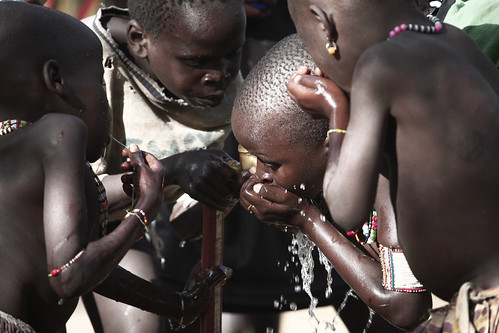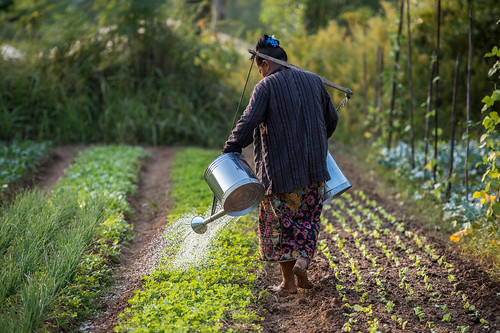世界水論壇 聯合國預告「水資源外交」新時代
Category: 水新聞 Created: Monday, 20 April 2015 05:00聯合國糧農組織(FAO)和世界水理事會14日於第七屆世界水論壇指出,2050年的水資源雖仍足以生產全球90億人的糧食,但過度消耗跟氣候變遷,將讓最需要水的地方更缺水。
2050年水需求增55% 農業用最兇
1997年起,每3年一屆,第七屆世界水論壇上週在南韓大邱落幕。今年由世界水理事會、南韓政府、大邱市和慶北省合辦,並在會中發表報告《邁向水資源和糧食安全的未來》。
上月,聯合國教科文組織(UNESCO)為322世界水資源日發表的《2015世界水發展報告》也指出,2030年地球水資源將會短少40%,除非國際社會能大幅改善水資源管理;而2050年的水需求將增加55%,同時地球20%的地下水已經被過度開發。
FAO預測,2050年全世界需要的糧食將增加60%,讓水資源壓力更大。農業是用水最兇的產業,在許多國家消耗河流、湖泊和含水層水資源至少2/3。
FAO認為,水資源管理仍有進步空間,呼籲政府以公平、包容的方式分配水資源,幫助農民更有效率地管理,用有限水資源增加糧食產出。
聯合國表示,目前正在規劃後2015年的目標,將以永續性為發展活動的核心。
聯合國:「水資源外交」時代來臨
聯合國副秘書長Jan Eliasson指出,隨著水資源短缺風險造成地理政治的緊張並抑制發展,國際社會必須準備迎接「水資源外交」的時代。
「缺水造成個人的悲劇,也漸漸威脅國際和平和安全。有必要以『水資源外交』的方式──讓有限的水資源成為合作而非衝突的源頭。」Eliasson說。
每日,全世界有1,000個兒童死於危險飲用水、衛生條件差造成的腹瀉。剛果民主共和國、莫三比克和巴布亞紐幾內亞這3國,有超過一半的人口未能享用良好的飲用水品質。
「直到近10年,人們才對水資源對健康和經濟的影響有更進一步的認識,包括水對家庭、工業、農業、城市、能源生產和運輸的重要性。」聯合國大會主席Sam Kutesa表示。
Kutesa認同,千禧年發展目標的運作的確有所成果,但是全球仍有8億人無法取得更好的水資源,更多人缺乏安全和永續的水資源。
聯合國水資源與衛生人權特別報告員Léo Heller說,「我們需要更妥善運用資源──確認水資源風險最高的對象並針對他們有所作為、實行有效的可承受性機制、建立必要的具體管控框架,監看哪些人從介入措施受益,哪些人沒有享受到介入措施的好處,實現平等無歧視的水資源管理。」
In 2050 there will be enough water to produce food for a global population of nine billion, but over-consumption and climate change will increase water scarcity in the planet’s neediest regions, finds a new report from the UN Food and Agriculture Organization and the World Water Council.
The report, “Towards a water and food secure future” was released Tuesday at the Seventh World Water Forum now underway at the Daegu EXCO. Held every three years since 1997, this year’s forum is jointly organized by the World Water Council, the Republic of Korea, the city of Daegu and the province of Gyeongbuk.
Meanwhile, another UN agency reports the planet will face a 40 percent shortfall in water supply in 2030 unless the international community “dramatically” improves water supply management.
The 2015 World Water Development report, released by UNESCO for World Water Day, March 22, predicts that demand for water will increase 55 percent by 2050 while 20 percent of global groundwater is already overexploited.
The FAO predicts that by 2050 some 60 percent more food will be needed to feed the world, placing added stress on water supplies. Agriculture is already the most water-intensive industry, accounting for at least two-thirds of the water drawn from rivers, lakes and aquifers in many countries.
Water supply improvements are possible, says the FAO, calling for governments to allocate water rights “in fair and inclusive ways” and to help farmers increase food output even with limited water resources by empowering them to better manage water scarcity risks.
The UN is now formulating post-2015 goals that place sustainability at the core of its development activities.
The international community must gear up for a new era of “hydro-diplomacy” as the threat of water scarcity risks plunging the world into a period of geopolitical tension and stunted development, UN Deputy Secretary-General Jan Eliasson told the UN General Assembly March 30.
“The lack of water causes individual tragedies,” he said. “And it also, growingly, constitutes a threat to international peace and security. There is a need for ‘hydro-diplomacy’ – making scarce water a reason for cooperation, rather than a reason for conflict.”
Every day nearly 1,000 children die from diarrhea linked to unsafe drinking water, poor sanitation, or poor hygiene. In three countries – the Democratic Republic of the Congo, Mozambique and Papua New Guinea – more than half the population does not have improved drinking water.
“The impact of water on human health as well as economic well-being is better understood than a decade ago, including water’s critical importance for households, industries, agriculture, cities, energy production and transportation,” said President of the UN General Assembly Sam Kutesa in a message to the meeting.
Kutesa recognized progress made under the Millennium Development Goals, yet, he said, 800 million people continue to live without access to an improved water source while many more are without a safe and sustainable water supply.
Léo Heller, UN Special Rapporteur on the human right to water and sanitation, said, “What is needed is a better application of resources – by identifying and targeting those who still do not have access; by practicing effective mechanisms for affordability; by integrating the principle of equality and non-discrimination in policies and programs and by putting in place the necessary physical and regulatory frameworks to monitor who are benefitting from interventions and who are being left behind.”
※ 全文及圖片詳見:ENS
Powered by Finanznachrichten










